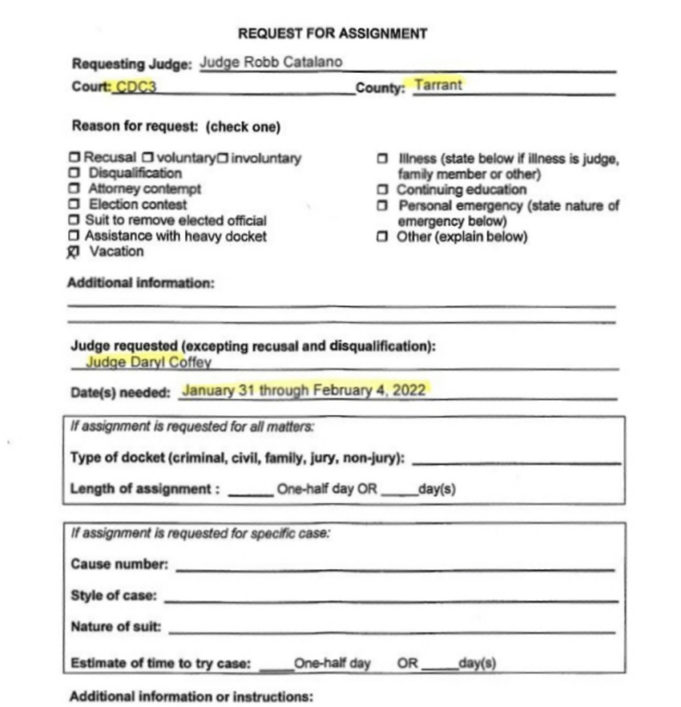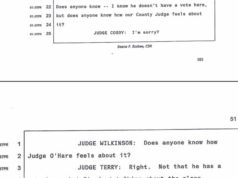When it comes to government work, the line between doing personal favors for friends and breaking the law depends on the degree of the infraction and whether the officials were caught in the act. Our magazine frequently reports on the type of insider deals that recently saddled New York’s former lieutenant governor with bribery charges.
A federal prosecutor recently described them.
“A quid pro quo,” he said, describing the tactics of Brian Benjamin, who recently resigned. “This for that. That’s bribery, plain and simple.”
Federal law enforcement agents recently arrested Benjamin, and federal prosecutors are accusing him of offering state grant funds in return for campaign contributions. The case is a reminder that government officials who use their positions to benefit themselves or friends risk breaking state and federal laws. Whether at the state or federal level, bribery is a felony charge that can lead to steep prison sentences, which is why one Tarrant County court form recently caught our attention.
Request for Assignment forms are locally filed with Judge David Evans, presiding judge of the Eighth Administrative Judicial Region that includes Tarrant County. The form allows county and district judges to request time off. Scheduled hospital visits, personal emergencies, and illness are all perfectly acceptable reasons a judge may need to miss a day or two on their docket. What defies explanation, though, is why Tarrant County’s judges are allowed to personally request who fills in for them. Near the top of the Request for Assignment form is a space labeled “Judge requested.” Since most active judges maintain a busy schedule, ones who ask for time off typically request a visiting retired judge to fill the short-term court vacancies.
Defendants can reasonably believe that the judge who presides over them is not selected for personal or unethical purposes. According to Tarrant County’s website, a computer randomly chooses one of 10 district courts for felony cases, but there’s a loophole that allows visiting retired judges — judges whose term of office has ended — to earn hundreds of dollars a day sitting in for judges who requested them.
Across the state, visiting retired judges are paid a daily rate on par with the court they’re sitting on. Tarrant County district judges earn $160,000 a year, meaning that anyone sitting in on a district court stands to earn nearly $500 a day. Judges being able to pick their friends means they’re putting college affiliations and neighborhood associations above jurisprudence.
Evans maintains a public list of visiting retired judges who are eligible for assignment, and he should end the current system that allows active judges to choose who sits in for them during vacancies. Doing otherwise gives the appearance that certain judges are given preference for personal or self-serving reasons. Tarrant County’s criminal judges, active and retired, are part of a good ol’ boy club that, if given the chance, will take advantage of county resources for selfish purposes.
In 2007, the Weekly reported that Judge Phil Sorrells, who is now retired and currently in a runoff with book banner Matt Krause for the Republican nomination for district attorney, allegedly skirted state law when appointing attorneys from the law firm of Trent Loftin, who is currently running as a Republican for Tarrant County Criminal Court No. 10, where Sorrells presided until late last year. Loftin and Sorrells are known to be longtime friends.
“In February, more than half the appointments made by County Criminal Court Judge Phil Sorrells went to only three attorneys, including Trent Loftin, who received 27 of the 79 appointments,” we reported at the time.
Our magazine is investigating new allegations from one whistleblower that the quid pro quo between Sorrells and Loftin continued until Sorrells recently retired.
The appearance of favoritism when assigning visiting retired judges isn’t the only form of judicial double-dealing in Tarrant County. In late January, former Tarrant County Justice of the Peace Jacqueline Wright prepared for a trial that she thought would be presided over by Judge Robb Catalano. Wright was unaware that, two weeks before her trial date, Catalano had requested visiting retired Judge Daryl Coffey to sit in.
Our reporting found that Coffey has his own history of allegedly tampering with government documents (“Moonlighting as a Senior Judge?” April 13). On Nov 18, 2014, as part of his election to serve as a visiting retired judge following retirement, Coffey allegedly filed a falsified Statement of Appointed Officer — alternately known as the anti-bribery oath — with Judge Evans. The document that appears to have been drafted by Coffey is missing language that Texas’ Congress added via constitutional amendment in 2001: “Under penalties of perjury, I declare that I have read the foregoing statement and that the facts stated therein are true.”
It may seem minor, but in a world where every word matters and lives and livelihoods are at stake, it’s actually not.
Coffey is far from the only judge in Texas who allegedly disregards state laws after retirement. Our statewide search for similar cases found several visiting retired judges across the Lone Star State who have failed to file their oaths of office after retirement or filed falsified government documents. Texas’ Court of Criminal Appeals ruled in 1999 that a judge’s Oath of Office terminates on the first day of retirement, meaning that the rulings of any visiting retired judge who does not take and file a valid oath of office with each new assignment are void and as such can be overturned upon appeal.
Coffey also appeared to consider himself a senior judge, a designation that can be bestowed only by Texas Chief Justice Nathan Hecht and that allows select visiting retired judges to be assigned to cases throughout the state.
Coffey’s days as a visiting retired judge appear to be over. In February, Judge David Hagerman filed a Request for Assignment form with Evans, seeking the appointment of Coffey to Hagerman’s 297th District Court in mid-June and within weeks of the May murder trial of former police officer Aaron Dean. Days before the publication of our story about Coffey, Hagerman submitted another request, this one for visiting retired judge Mollee Westfall. In an email to us, Evans said the change in assignment was due to a “scheduling conflict” by Coffey, a statement that we found to be misleading at best.
Following the publication of our story on Coffey, Evans considerably slowed the release of other documents we have requested under what is known as Rule 12. As part of our ongoing investigation into Tarrant County’s visiting retired judges, we are seeking the types of oaths and documents that Coffey allegedly falsified or simply failed to file from several retired Tarrant County judges. We are also seeking documents from Hagerman and Catalano.
The rulings of retired judges who have not taken and filed an oath of office after retirement are void and subject to being overturned. Texas’ Court of Criminal Appeals is clear on this matter even if visiting retired judges falsely believe they are above the law.
This column reflects the opinions of the editorial board and not the Fort Worth Weekly. To submit a column, please email Editor Anthony Mariani at Anthony@FWWeekly.com. Submissions will be edited for factuality, concision, and clarity.












